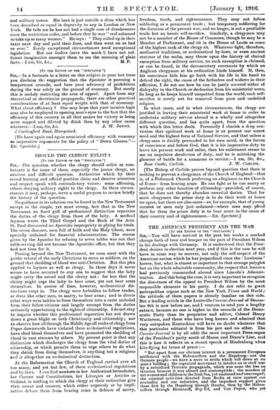SHOULD THE CLERGY ENLIST ?
[To THE EDITOR OP THE SFECTATOR.1 81-R,—The question whether the clergy should enlist as com- batants is for some of them, especially the junior clergy, an anxious and difficult question. Authorities which by their sound learning and official position claim and deserve attention and respect speak with contradictory voices : some affirming, others denying military rights to the clergy. In these circum- stances it may, perhaps, serve a useful purpose to review briefly the history of the question.
No guidance in its solution can be found in the New Testament except in the simple, yet most strong, fact that in the New Testament no fixed gulf of professional distinction separates the duties of the clergy from those of the laity. A medical layman wrote the Third Gospel and the Book of the Acts. St. Paul discovered no Apostolic impropriety in plying his trade. The seven deacons, men full of faith and the Holy Ghost, were specially ordained for financial administration. The reason given by the Apostles for refusing to serve tables was not that table-serving did not become the Apostolic office, but that they had not time for it.
Passing beyond the New Testament, we soon meet with the public refusal of the early Christians to serve as soldiers, on the ground that shedding of blood was anti-Christian. But this plea applied to laymen as well as clergy. In those days it never seems to have occurred to any one to suggest that the laity might carry the sword and the clerisy not : far less that the clerisy might urge the laity to bear arms, yet not bear arms themselves. In course of time, however, ecclesiastical dis- tinctions crept in. The clergy were forbidden to• follow trades, or dress like other men, to marry, to bear arms ; and in divers other ways were bidden to form themselves into a caste secluded from their fellow-citizens and largely exempt from the duties ordinarily appertaining to the rightsof citizenship. I do not stay to inquire whether this professional separation has not drawn down a great blight on both Christianity and citizenship ; nor to observe how all through the Middle Age all ranks of clergy from Popes downwards have violated these ecclesiastical regulations, have shed blood themselves and have promoted the shedding of blood in .vast streams by others. My present point is that any distinction which discharges the clergy from the vital duties of citizenship, or which permits them to urge others to do what they shrink from doing themselves, is anything but a religious and is altogether an ecclesiastical distinction.
At the Reformation the Church of England carried over all toe many, and yet but few, of these ecclesiastical regulations and by-laws. I can find nowhere in her Authorized formularies, her Canons and Constitutions, her Liturgies or Articles or Ordinal, in nothing to whieh the clergy, at their ordination give their assent and consent, which either expressly or by impli- cation debars them from bearing arms in defence of mercy, freedom, truth, and righteousness. They may not follow soldiering as a permanent trade ; but temporary. soldiering for the duration of the present war, and no longer, is not a profitable trade but an heroic self-sacrifice. Similarly, a clergyman may not be, a member of the House of Commons, though`he may be a Member of Parliament, and sit in the House of Lords as some of the highest rank of the clergy sit. Whatever light, therefore, mediaeval traditions, or ecclesiastical hy-laws, or even- ancient statutes' of the realm, may throw upon the history of aeries/ exemption from military service; no such exemption is claimed; or can be found, in the documentary covenants• by which. an Anglican clergyman at his ordination binds himself. If, thei4 his conscience bids him go forth with his life in his' band to defend the right, the cause of the fatherless and widows in their affliction, I do not see how he can be justly accused 'either of disloyalty to the Church or declension from his ministerial- vows: So long as he keeps himself unspotted from the world, such self= sacrifice is surely not far removed from pure and undefiled religion.
Tn what cases, and in what circumstances, the clergy are justified in leaving their ministerial work at home' in order to undertake military service abroad is a wholly and altogether different question, and lies- quite apart, from the question with which this letter deals. Personally I cherish a deep con- viction that spiritual work at home is at present our sorest need and the highest form of National Service, and that unless a clergyman is doubly persuaded in his own mind, in the forum of conscience and before God, that it is his imperative' duty to leave his present work and enlist, then his enlistment seems• to me an impulsive dereliction of duty, and he is mistaking the glamour of battle for a summons to service.—I am, Sir, &e., [The Bishop of Carlisle proves beyond question that there is nothing to prevent a clergyman of the Church of England—that is, of a Reformed Church professing no allegiance to the Church of Rome—from bearing arms. He can fight as he can marry or perform any other function of citizenship—provided, of course, that he does not thereby abandon essential duties. That for most clergymen the prime duty is to do their work at home we agree, but there are also oases—as, for example, that of young curates or men only just ordained—where men may plsad that for them the prime duty is to bear arms in the cause of their country and of righteousness.—En. Spectator.]










































 Previous page
Previous page